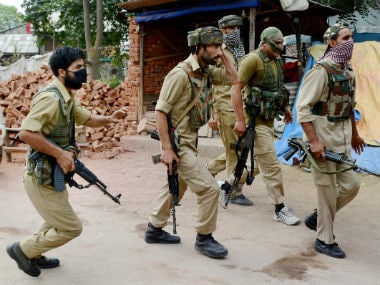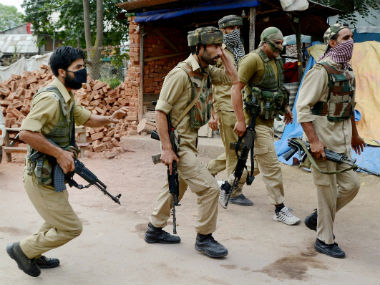The gloves are off in battleground Kashmir. Sons and other close relatives of policemen have been abducted, while the father of a dreaded militant has been detained, over the past couple of days. By Friday afternoon, a dozen close relatives of men in the police force had been reported abducted since Wednesday.[caption id=“attachment_4950161” align=“alignleft” width=“380”]
 Representational image. PTI
Representational image. PTI
[/caption] This has created a climate of panic among families across the Valley, particularly those who have a relative in the police force. The force has close to 120,000 members in the state, including Special Police Officers. The detention on Thursday of the father of leading Hizbul Mujahideen militant Riyaz Naikoo had escalated this round of abductions, which Riyaz described as ’tit-for-tat’ action. Riyaz is known for a sharp temper and a ruthless mien. And he has a strong hold on the militants’ command structures. He is probably the mastermind behind the abductions of policemen’s relatives in different parts of the Valley. Echoes of 1990 This situation needs to be handled sensitively and with nuance. For the moment, it has compromised the security environment in the Valley very badly. On Thursday, several police officers bravely tweeted about their determination to carry forward their struggle, but a loss of morale under the surface could nevertheless unsettle the police force. The current trend brings to mind the situation in 1990, when the morale of the local police had been deeply undermined. When the SHO of the Maisuma police station was shot on the street, it took some time for anybody to even go to his body. And, in March that year, when a deputy superintendent of police from outside the state was dispatched to maintain order when lawyers had marched on the UN military observers’ office in Srinagar, he turned to find that none of the platoon that had been behind him were there at the gate of the UN office. Of course, the police force today is a vastly better trained and equipped force than it was then. Indeed, thousands of crores of rupees have been spent on this since 1995. Motivation levels too have been very high among several sections of the force, despite unnerving events. One of these was the suicide attack at a CRPF camp next to the the Police Lines at Awantipora, on the main highway. To that extent, the current situation is not even nearly like that which obtained in 1990—the year when terrorised members of the Pandit community left the Valley in very large numbers. Persistent effort To render the local police ineffective is evidently a very major part of the gameplay of those who are coordinating the extraordinary challenge to security that is unfolding in Kashmir. There has been a concerted attempt by militants and their coordinators over the past three years to make the Jammu and Kashmir Police force stop their counterinsurgency work. Although the effort has been ineffective overall, the pressure has been mounting steeply of late. It was Burhan Wani, the militant commander who was killed in July 2016, who first called for the local police to stop their work on behalf of the state. His repeated appeals and warnings argued that policemen must help their fellow-Muslim militants to fight what he described as a jihad. After Burhan, several other militant ‘commanders’, including Zakir Musa Bhat and Naikoo, who is currently in focus, have issued similar appeals and warnings. The targeting of police-affiliated families has now become another prong of the psychological war of those messages, which directly targeted policemen. The process has certainly made some headway. The ease with which four Special Operations Group policemen were killed in Shopian on Wednesday indicates the change in perceptions and responses since 2015. When the fabled police sub-inspector Altaf ‘Laptop’ was killed in a well-planned operation in October that year by Abu Qasim—the Lashkar-e-Taiba commander who was one of the prime movers of this new round of militancy—the police killed Qasim within just a few weeks. Even when Burhan was killed in July 2016, morale was so high that police officers vied with the army to take credit.
David Devadas is an expert on politics and geopolitics. Formerly a Senior Fellow at the Nehru Memorial Museum and Library, Visiting Professor at Jamia Millia Islamia, and Political Editor of Business Standard, he is currently Distinguished Fellow at the Institute for Social Sciences. He has written books on Kashmir, on youth, and on history. He has been a radio compere, guest faculty at JNU's Academic Staff College, St Stephen's College and Hindu College. He has worked for the Indian Express, The Hindustan Times, India Today, The Economic Times and Gulf News. His most impactful article, on a murder cover-up, prevented a Congress President from becoming prime minister. One led to the closure of an airline, and another created a furore and consequent clean-up in Delhi's health department. Several have correctly predicted election results in key states, and a series of reports from Srinagar made the government aware of how unsettled the situation there was in 1990. He is an alumnus of St Xavier's School, St Stephen's College, and the Indian Institute of Mass Communication. He has lived for extended periods in Geneva and Berlin, and has traveled to almost 50 countries. He enjoys various kinds of music, theatre, design, architecture and art.
)